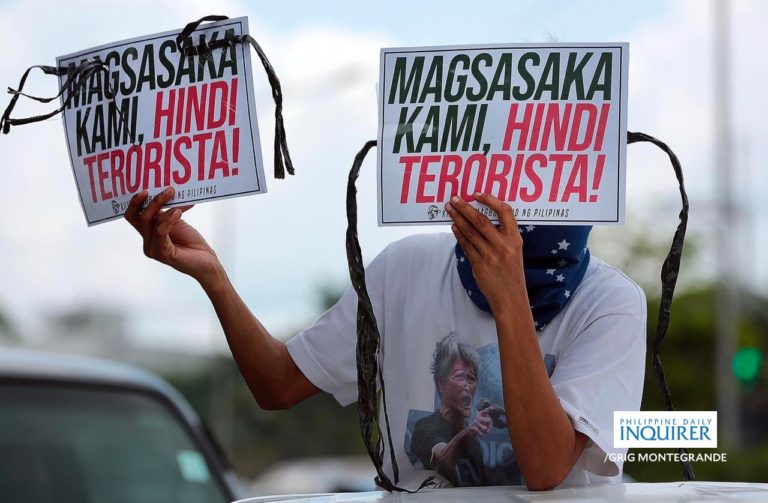Anti-terror law, may mga malabo, butas na probisyon–FEU law dean

Isang magsasaka ang may hawak-hawak na placard laban sa anti-terror law. (Grig C. Montegrande/Inquirer)
May mga butas at hindi malinaw ang ilang probisyon ng bagong anti-terror law at maaari pa itong magamit laban sa media, ayon sa dean ng Far Eastern University Institute of Law.
Pero isang bagay ang sinabi ni Dean Atty. Melencion Sta. Maria Jr. na malinaw sa Anti-Terrorism Act of 2020: ito ay ang paggamit ng salitang “suspicion.”
“Ang iba malabo, pero there is one very clear usage of a word—suspicion. Doon hindi tayo nagtatanong, sa akin malinaw na malinaw iyon,” sabi ni Sta. Maria sa isang webinar na may temang “Mass Media and the Law” na idinaos noong Huwebes.
Sinabi ni Sta. Maria na mukhang intensiyon ng batas na ilagay ang salitang “suspicion” dahil ilang beses itong nagamit sa batas na nilagdaan ni Pangulong Rodrigo Duterte noong Hulyo 3 at naging epektibo noong Hulyo 18.
“Suspected of committing crime has been repeated not once, not twice, not thrice but eight times in the law. Kung sunod-sunod na ginamit ‘yung phrase na ‘yun alam natin hindi aksidente ‘yun, sinadya ‘yun,” paliwanag ni Sta. Maria.
Pinuna rin niya ang isinasaad ng Section 29 ng anti-terror law na maaaring ilagay ng sinumang militar o pulis sa kustodiya ang mga taong pinaghihinalaang lumalabag sa Section 4 hanggang Section 12 ng batas.
Wala rin aniyang malinaw na interpretasyon ang salitang “suspected” sa ilalim ng Section 3 ng batas kung saan nakasaad ang definition of terms.
Dagdag pa ni Sta. Maria, sa ilalim ng naturang batas, ang Anti-Terrorism Council (ATC) ang magdedesisyon kung sino ang maituturing na terorista.
Tungkol naman sa pamamahayag, eto ang tanong niya sa naturang webinar na pinungunahan ng Philippine Bar Association: “Is the government weaponizing the law against media?”
Samantala, nilinaw naman ni Chief Presidential Legal Counsel Salvador Panelo na hindi nakasaad sa Section 29 na binibigyang kapangyarihan ng ATC ang mga pulis na manghuli.
“They’ve been misreading this Section 29… [Sa ilalim ng section 16 at 17] If a police officer or military person suspects someone to be involved in terrorism, what they will do is to ask permission to ATC to file an action with the court of appeals,” pahayag ni Panelo sa parehong webinar.
Tinalakay rin sa webinar ang libel case ni Rappler CEO Maria Ressa at ang hindi pagbibigay ng prangkisa sa ABS-CBN.
Dumalo rin sa webinar sina Lyceum of the Philippines (LPU) College of Law Dean Ma. Soledad Margarita Deriquito-Mawis, LPU Professor Atty. Carlo Cruz at PBA first Vice-President Rico Domingo.
Katuwang ng PBA ang Harvard Law School Alumni Association of the Philippines at ang LPU College of Law sa programang ito.
Disclaimer: The comments uploaded on this site do not necessarily represent or reflect the views of management and owner of Bandera. We reserve the right to exclude comments that we deem to be inconsistent with our editorial standards.


